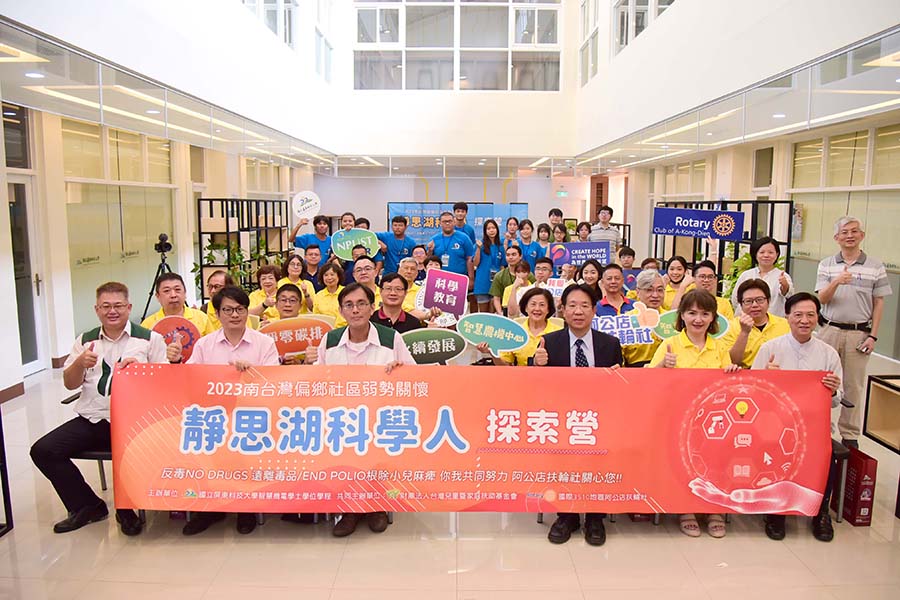NPUST, the A-Kong-Tien Rotary Club, and the Fund for Children and Families (FCF) jointly hosted an education camp for students from disadvantaged rural communities in Southern Taiwan. From July 17th to 21st the “Jingsi Lake Scientist’s Exploration Camp” was held to promote Industry 4.0, robot applications in industry, IoT, Green energy science and more. Combined with care activities for disadvantaged communities, the five-day science camp was organized for high school (vocational) students registered at Family Support Centers in Kaohsiung, Pingtung, and Taitung counties. The opening ceremony was held at 9:00 am on July 18th at the NPUST Data Center. University president, Chin-Lung Chang, A-Kong-Tien Rotary Club director, Sophia Hsu and former director Cheng-Kai Huang, former director of Fund for Children and Families, Cheng-bin Chen, and Professor Hudson Hsu were joined by teachers and students from the university for the unveiling ceremony.
NPUST President Chin-Lung Chang said “this five-day science experience has been organized for high school students supported by Family Support Centers in in Kaohsiung, Pingtung, and Taitung counties. With focus given to Industry 4.0, robotic arms, drones, IoT, and career development, the courses are rich in content and will allow students to broaden their horizons, absorb new knowledge, unleash their potential, and build self-confidence. I believe that in the near future, all students will have the opportunity to bring themselves out of poverty and become backbones of social industry. And so, I would like to thank the members of the Rotary club and entrepreneurs present here today. In addition to donating materials to the students, they are also providing the families with enthusiastic care and allowing them to feel the warmth of society. By contributing money, effort, and time, I believe that the world will be a better place because of you.”
A-Kong-Tien Rotary Club director, Sophia Hsu, said “the Rotary Club’s areas of services include disease, environmental protection, education, and more. In cooperation with National Pingtung University of Science and Technology, we are able to bring science education to rural areas so that more students have access to it. The Rotary Club attaches great importance to such services.”
Former FCF director Cheng-bin Cheng said “through this activity, we hope to help rural children enrich their learning experiences, and enhance their understanding of different fields of knowledge, so they can find their future aspirations.”
The camp was organized in cooperation with the Ministry of Education’s University Social Responsibility (USR) Project and the National Science Council’s Popular Science Initiative. A number of professors who specialize in related fields of expertise assisted with the teaching. Associate Professor Sun-Li Wu, a robotic arms expert, taught the students about Industry 4.0 technology and unmanned factory technology. Professor Chun-fa Cheng, who is an urban planner and responsible for government land planning and UAV aerial photo education, taught the students how integrate travel photos with the google map system. Associate Professor Mike Chen provided instruction on IoT and other technological life applications, and Professor Hudson Hsu and three other teachers helped the students take flight through simulator training for remote-controlled aircraft and FlySky remote-controlled aircraft flying. The students also had a chance to put their skills to the test in a four-axis obstacle course. Evening-time activities included self-study and lectures on career planning, potential development, and science competitions. With a desire to also share the warmth of society with the families of the students, the A-Kong-Tien Rotary Club donated rice, cooking oil, sleeping bags and other livelihood materials to each student. They also carried out an anti-drug and polio eradication publicity activity, to share related information. Hopes are that through the science games and courses, the students will be inspired to create visions for their futures, and be opened up to new opportunities normally unavailable to young students from disadvantaged communities.

